
Black teachers: How to recruit them and make them stay

Lessons in higher education: What California can learn

Keeping California public university options open

Superintendents: Well-paid and walking away

The debt to degree connection

College in prison: How earning a degree can lead to a new life

At a legislator’s request, the California State Auditor will audit the cost and results of Los Angeles Unified School District’s practice of removing teachers from the classroom, sometimes for hundreds of days, when the district investigates allegations of misconduct.
“The need for this audit is two-fold,” said State Sen. Tony Mendoza, D-Artesia, who requested the audit and won approval for it at a Joint Legislative Audit Committee hearing Wednesday. “We must rapidly resolve issues of sexual misconduct and terminate such employees, while also exonerating those employees who are innocent to keep them from languishing in limbo.”
Misconduct allegations include being verbally abusive, excessively absent from work, failing to follow the rules for administering standardized tests or engaging in sexual misconduct. The audit, which is expected to take eight months, will determine the cost of removing teachers from classrooms and whether disciplinary actions are “fair and just” in their timeliness and appropriateness, Mendoza said.
Teachers accused of misconduct and banned from classrooms are known as “housed teachers” by the district, but Los Angeles teachers often refer to such expulsions as being sent to “teacher jail.” Before the district changed its policy in May 2014, teachers under investigation were required to report to rooms in administrative buildings to spend school hours under supervision. They now are allowed to remain at home.
The audit follows a class action lawsuit filed against the district in October 2015 by Los Angeles Unified 5th-grade teacher Rafe Esquith, who charged that the district’s discipline practices against teachers amount to “unconstitutional imprisonment.” The district “does not provide any opportunity to contest the removal, nor does it provide any information regarding why the removal is taking place,” the lawsuit claimed. The lawsuit seeks $1 billion in damages on behalf of 2,000 teachers. Esquith was removed from his classroom in April 2015 for allegations of misconduct and was reportedly fired in October.
But during the legislative hearing, Justo Avila, chief human resources officer for Los Angeles Unified, said the district had revamped its practices in the last nine months in collaboration with the teachers’ union, United Teachers of Los Angeles. The district meets monthly with union leaders to review how long teachers have been removed from classrooms and what category of allegation they face, Avila said. The result has been a sharp reduction from the more than 350 teachers who were removed from classrooms in 2014.
Avila said the number now stands at 139 teachers. He said teachers are no longer removed from classrooms following allegations of misconduct related to such things as not administering a standardized test properly. “If they don’t represent a threat to the safety of our students, they go back to their work while we do our investigation,” Avila said.
The result, he said, is that “73 percent of currently reassigned employees are reassigned due to sexual misconduct allegations.”
That amounts to 101 school district employees who are at home because of sexual misconduct allegations, he said, which he said was “.002 percent of the employee population, which is still too much.”
This will be the second state audit in four years to examine Los Angeles Unified’s procedures for handling misconduct complaints against school employees. A 2012 audit called for the district to improve its handling of allegations that employees were sexually or physically abusing students, including the need to promptly report disciplinary actions against teachers to the California Commission on Teacher Credentialing. In a September 2015 followup to the audit, the state auditor’s office said the district had complied with its recommendations and improved its handling of child abuse accusations against employees.

A grassroots campaign recalled two conservative members of the Orange Unified School District in an election that cost more than half a million dollars.

Legislation that would remove one of the last tests teachers are required to take to earn a credential in California passed the Senate Education Committee.

Part-time instructors, many who work for decades off the tenure track and at a lower pay rate, have been called “apprentices to nowhere.”

A bill to mandate use of the method will not advance in the Legislature this year in the face of teachers union opposition.
Comments
Comments Policy
We welcome your comments. All comments are moderated for civility, relevance and other considerations. Click here for EdSource's Comments Policy.